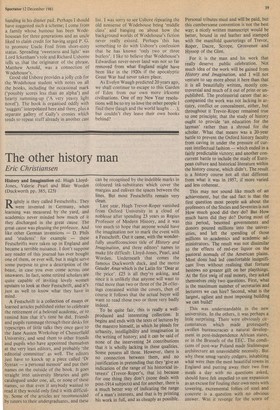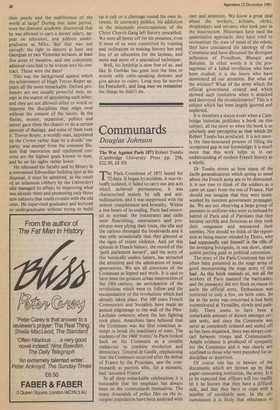The other history man
Eric Christiansen
History and Imagination ed. Hugh LloydJones, Valerie Pearl and Blair Worden (Duckworth pp. 385, £25)
Rightly is they called Festschrifts. They were invented in Germany, when learning was measured by the yard, and academics never minded how much of it they discharged in the great cause. The great cause was pleasing the professor. And like other German inventions — D. Phils and 'students' for example — these Festschrifts were taken up in England and became a terrible nuisance. I don't suppose any reader of this journal has ever bought one of them, or ever will, but it might serve some purpose to give a description of the beast, in case you ever come across one unawares. In fact, some retired scholars are quite capable of inviting lovely women upstairs to look at their Festschrift, and it's just as well to know what they have in mind.
A Festschrift is a collection of essays or learned articles published either to celebrate the retirement of a beloved academic, or to remind him that it's time he did. Friends and pupils rummage through their desks for typescripts of little talks they once gave to the Jane Austen Workshop of Chesterfield University, and send them to other friends and pupils who have appointed themselves at the very least editors, and probably 'the editorial committee' as well. The editors just have to knock up a piece called 'Dr Syntax — a personal memoir' and put their names on the outside of the book. It goes straight into university libraries and gets catalogued under one, all, or none of these names, so that even if anybody wanted to read it they would only find it with difficulty. Some of the articles are recommended by tutors to their undergraduates, and these can be recognised by the indelible marks in coloured ink-substitutes which cover the margins and enliven the spaces between the lines. But most Festschrifts remain very clean.
Last year, Hugh Trevor-Roper vanished from Oxford University in a cloud of noblesse after spending 23 years as Regius Professor of Modern History, and it was too much to hope that anyone would have the imagination not to mark the event with a Festschrift. Out it came, with the wonderfully unselfconscious title of History and Imagination, and three editors' names to make life difficult: Lloyd-Jones, Pearl, and Worden. Underneath that comes the famous Duckworth duck, and the motto Gaudet Anas which is the Latin for 'Dear at the price'. £25 is all they're asking, and since it is unlikely that anyone will want to read more than two or three of the 26 offerings contained within the covers, then of course it follows that the actual buyer will want to read those two or three very badly indeed.
To be quite fair, this is really a wellproduced and interesting collection. It begins and ends with the texts of lectures by the maestro himself, in which he pleads for urbanity, intelligibility and imagination in the writing of history; and it can be said of none of the intervening 24 contributions that it is wholly lacking in these qualities. Some possess all three. However, there is no connection between them, and no justification in pretending that they 'give an indication of the range of his historical interests' (Trevor-Roper's, that is) because for one thing they don't (none deals with post-1914 subjects) and for another, there is a much better way of indicating the range of a man's interests, and that is by printing his work in full, and as cheaply as possible. Personal tributes must and will be paid, but this cumbersome convention is not the best way; a nicely written manuscript would be better, bound in red leather and stamped with the manifold quarterings of Trevor, Roper, Dacre, Scrope, Grosvenor and Hyssop of the Glen.
For it is the man and his work that really deserve public celebration. Not much idea of the work will be gained from History and Imagination, and I will not venture to say more about it here than that it is all beautifully written, mostly controversial and much of it out of print or unpublished. The professorial career that accompanied the work was not lacking in artistry, conflict or concealment, either, but throughout it Trevor-Roper remained true to one principle; that the study of history ought to provide 'an education for the layman' rather than a shroud for the scholar. What that means was a 20-year battle to prevent the Oxford history faculty from caving in under the pressure of current intellectual fashion — which ended in a fairly predictable victory; and another concurrent battle to include the study of European culture and historical literature within the history course, which didn't. The result is a history course not all that different from what it was in 1957, if more varied and less coherent.
This may not sound like much of an achievement, but the sad fact is that the first question most people ask about the professors of the Sixties and Seventies is not How much good did they do? But How much harm did they do? During most of this period, besotted governments and donors poured millions into the universities, and left the spending of those millions to academics and academic administrators. The result was not dissimilar to the effects of red-eye liquor on the pastoral nomads of the American plains. Most dons had led comfortable insignificant lives without realising that fortune bestows no greater gift on her playthings. At the first swig of real money, they asked themselves only two questions. First, what is the maximum number of secretaries and lecturers we can hire? Second, what is the largest, ugliest and most imposing building we can build?
This was understandable in the new universities. In the others, it was perhaps a little surprising. There were obviously circumstances which made grotesquely swollen bureaucracies a natural development in post-independence African states, or in the Brussels of the EEC. The conditions of post-war Poland made Stalinesque architecture an unavoidable necessity. But why these smug varsity codgers, inhabiting what were then the most beautiful towns in England and putting away their two free meals a day with no questions asked, should have felt impelled to use expansion as an excuse for fouling their own nests with towering, excremental follies of steel and concrete is a question with no obvious answer. Was it revenge for the scorn of their pupils and the indifference of the world at large? During that same period, even the dimmest academic discovered that he was allowed to earn a decent salary, appear on television, and address undergraduates as Mike. But that was not enough; the right to destroy at least one Georgian or two Victorian terraces, at least five acres of meadow, and one commonly admired vista had to be written into his contract. Those were the days!
This was the background against which the achievement of Hugh Trevor-Roper appears all the more remarkable. Oxford professors are not usually powerful men, except in the matter of appointing each other, and they are not allowed either to wreck or improve the disciplines they reign over without the consent of the tutors. In the Sixties, money, expansion, politics and unrest gave them the chance to do a certain amount of damage, and some of them took it. Trevor-Roper, a worldly man, appointed by the Crown rather than by a druids' teaparty, was exempt from the common illusion that innovation and reinforced concrete are the highest goals known to man, and he set his sights rather lower.
He rehoused his faculty and its library in a convenient Edwardian building (put at his disposal, it must be admitted, as the result of an infamous robbery by the University) and managed its affairs by improving what was already there and promoting only those new subjects that could co-exist with the old ones. He supervised graduates and lectured to undergraduates without trying to build up a cult or a clientage round his own interests. In university politics, his addiction to the minuscule preoccupations of the Christ Church Gang left history unscathed. We were all better off for his presence, even if most of us were committed by training and inclination to making history less and less of an education for the layman, and more and more of a specialised technique.
Well, his lordship is now free of us, and like St Guthlac has gone into the fens to wrestle with celtic-speaking demons and give advice to rulers. Long may he survive his Festschrift, and long may we remember the things he didn't do.







































 Previous page
Previous page